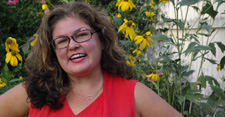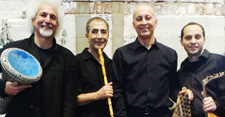Tuesday, October 11, 7pm
Priscilla Page

In a blend of research and storytelling, WOMEN WHO ARE FREE draws from Priscilla Page's most recent interviews with contemporary Latina theater artists in Chicago. A writer and dramaturg as well as a member of the dramaturgy faculty in the Department of Theater at the University of Massachusetts Amherst, her research includes Latina/o Theater and Contemporary Native American Performance. She worked as the program curator for New WORLD Theater at UMass Amherst for five years. Her producing/ dramaturgy credits include My Bronx, written and performed by Terry Jenoure and directed by Linda McInerney; sash & trim, written and performed by Djola Branner and directed by Laurie Carlos; Crossing the Waters, Changing the Air, written and directed by Ingrid Askew. She served as the dramaturg for Collidescope 2.0: Adventures in Pre and Post Racial America, co-written and co-directed by Ping Chong and Talvin Wilks, April 2016. She has also worked closely with playwright Migdalia Cruz and her essay “My World Made Real” is published in Cruz’s anthology El Grito Del Bronx, No PassPort Press, 2010. She is the editor for Wings of Night Sky, Wings of Morning Light by Joy Harjo, forthcoming publication by Wesleyan Press.
Layaali

Performing the traditional music of the Arab world, Layaali preserves the rich legacy of its culture through soulful vocals, hypnotic instrumental improvisations, electrifying percussion, and faithful renditions and recordings of master works. The musicians include: Jamal Sinno (qanun and vocals), Muhammed Mejaour (nay), Kinan Idnawi (oud), and Michel Moushabeck (tabla, riqq, daff). Arabic music, with its defining structure based on ancient modes called maqams, allows plenty of improvisation, individually and collectively. Layaali’s repertoire ranges from the great classical compositions of 19th and early 20th century masters such as Jamil Bey al-Tanburi, Tatyus Afandi, Riad al-Sinbati, and Sayed Darwish to the classics sung by the likes of Umm Kulthoum, Asmahan, Leyla Murad and Fairuz, from Muwashshahat (poetic compositions of Andalusian origin) and popular folk songs to the contemporary works of composers such as Ziad Rahbani. They include instrumental pieces that stretch the players’ limits as well as mournful songs that unfold like short stories in the warm and inviting voices of the vocalists.
More Information
Gallery Hours:
Mondays & Tuesdays 1-7 pm; Wednesdays through Fridays 1-5 pm
Contact Information:
103 New Africa House
University of Massachusetts
180 Infirmary Way
Amherst, MA 01003
(413) 545-5177
Gallery Director, Dr. Terry Jenoure
Gallery Manager, Alexia Cota
Directions
For GPS and mapquest:
180 Infirmary Way
Amherst, MA 01003

 Augusta Savage Gallery
Augusta Savage Gallery




